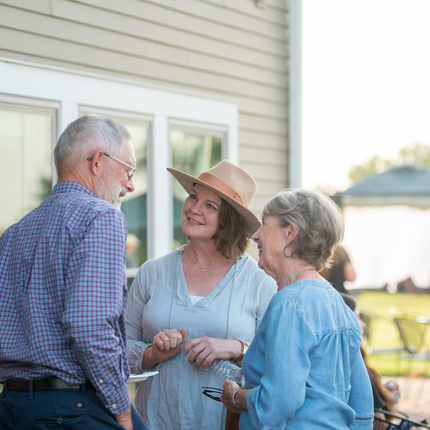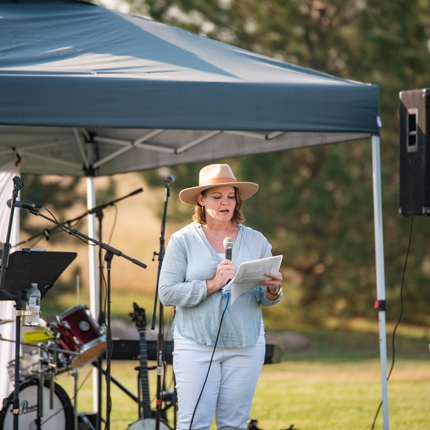By Julia Kleinschmit
Editor's note: Julia spoke at our 50th celebration event on Friday, Sept. 8, near Hartington. She served as an intern with the Center and her dad, Martin Kleinschmit, was a long-time staff member. Julia's parents, Martin and Linda, received our 2021 Seventh Generation Award.
Hello everyone, and happy anniversary!
I’m here to speak as a donor. I think I might be here under slightly false pretenses. Why? Because I’m a Center for Rural Affairs baby. My parents were part of the Small Farm Energy Project in 1976 when I was seven. I remember my dad building a solar water heater for the milk barn—which looked like a slide. Though told not to, my brothers and I tried it out and learned why you do not slide down a solar collector. Dad also built a solar food dehydrator and the dried apples my mom made were delicious. This was the beginning of my Dad’s renewable energy journey putting him out ahead of many, including the Center, when it came to seeing the potential that wind and solar offered farmers, ranchers, and rural communities. I remember getting together for picnics and cookouts with other Small Farm Energy Project farm families and Center staff, especially those based in Hartington.
Later, as a junior in high school, I asked the Center for an internship. I don’t think they really knew what to do with me but were gracious enough to let me spend the summer with them. Ron Krupicka loaded me up with required reading to understand farm policy. I read back issues of newsletters from the Center, the Land Stewardship Project, PrairieFire Rural Action, The Land Institute, the Farmers Union, the League of Rural Voters, and many others. Every day I came in and settled into my office—the breakroom—Ron would check on me and my reading pile and replenish it when it ran low. I read Wendell Berry, Francis Moore Lappe, Aldo Leopold, Merle Hansen, Rachel Carson. Henry A. Wallace (FDR’s Secretary of Agriculture), Earl Butz, (Nixon’s Secretary of Agriculture), and I think big chunks of the most recent farm bill. Some of it I learned by osmosis because I fell asleep on that reading pile more than a few times. I went out with Steve Hopkins on a couple of grass collecting missions which I enjoyed but didn’t really understand. Once in a while at the end of the day I would go with Ron, Steve, and Rich Ness to the Chief Bar across the street [in Hartington]. They’d have a beer, I’d drink—something—and we’d talk about what I was reading, what they were doing, music—the gamut. I think they almost threw me out when I said that the Violent Femmes were way better than Dire Straits, but I’m glad they didn’t. Now I realize what I did that summer was a graduate level course preparing me for all the work I’ve done since then.
Fast forward a few decades and I’m a grown up with a J-O-B and my own cash. Through the Center, I got to know truly lovely people like all the afore mentioned plus Don Ralston, Marty Strange, Chuck Hassebrook, Steve Ela, Wyatt and Jeanne Fraas, Larry Krcil, and Karen Tikalsky, a fellow social worker. Plus, my mom and dad were really involved with the organization—Mom served on the advisory board and Dad was on staff. I started donating to the Center out of a sense of obligation and nostalgia. But that’s not why I kept giving.
I support the Center for Rural Affairs because they engage in and practice systems thinking, they nurture and empower communities of freethinkers, and they are unapologetically rural—and inclusive while being so.
Building on my Aldo Leopold lessons, I earned a Masters in Social Work degree from the University of Iowa and now I’ve taught for them for almost 25 years. I tell my students that what differentiates social work from counseling and other helping professions is that social workers understand that people are impacted by their environment—and can impact their environments. This is systems thinking. So—if you’re a school social worker and Angeline shows up at school all down and won’t engage with her teacher or class, you don’t ask—what’s wrong with Angeline? You ask—what’s happening at home? What’s happening on the bus? Is Angeline hungry because she doesn’t qualify for free breakfast at school anymore? If you’re in Iowa, you ask—hmmm. Could this have something to do with Angeline wanting to talk about what happened at Indian Boarding Schools (which her grandma survived) and the teacher shutting it down because the teacher is afraid they’ll run afoul of rules prohibiting “divisive content” in class? Or, maybe Angeline didn’t get a good night’s sleep because trucks were going in and out of the neighboring hog confinement unit all night.
The Center understands systems thinking especially when it comes to the impact of policy on people’s lives and how people can impact policy. My 1985 summer reading pile included Wheels of Fortune, a Center critique of subsidies for growing corn in the Sandhills, sinking big pivots into the aquifer to do it, and Who Will Sit Up with the Corporate Sow, a 1974 report correctly predicting the devastating economic and environmental impacts of vertical integration and corporate concentration on hog farmers, their communities, and our environment. The Center’s analysis game is still strong, but equally important is their continued focus on helping individuals and communities build their policy and community advocacy skills. Recently, I visited the Center’s website and counted 11 staff members with “policy” in their titles and another 3 with “community organizing” in theirs. That’s some serious policy and skill building energy. I bet if I asked any of those 14 to find places where policy and grassroots advocacy could make a difference in Angeline’s life, they’d come up with the ones I’ve identified and then a bunch more. For example:
Why doesn’t Angeline’s family have enough money to pay for school breakfast but also too much to not qualify? That’s federal policy, budgetary choices by her school district (which in Nebraska could be a possible outcome of LB 753 that funnels public money into private schools), and economic development choices that don’t invest in her community. Why can’t Angeline learn real history about her people in her classroom? That’s state policy—and a misinterpretation of its regulatory requirements by her local school leadership and teacher. What’s up with that CAFO and its infernal trucking? I’m thinking county and state policy levers could be pulled, as well as federal farm policy subsidizing the whole damn thing.
The Center for Rural Affairs nurtures and empowers communities of freethinkers. Let’s face it. It can be hard and lonely to live in rural communities and work for something different from what the Chamber of Commerce and Farm Bureau would have us all do. You need people in your corner who can be romantic and pragmatic. Romantic enough to truly appreciate the beauty of where we live and the poetry and wonder of a natural system that converts sunlight into plants and grasses that hold the earth together, nurture a mind-blowingly complex soil system and feed animals that end up as tasty Kleinschmit beef on my plate. But, pragmatic enough to understand that farmers, ranchers, rural people and their families must make enough money to stay on their land and in their communities, to not just survive, but thrive. And, oftentimes that means those romantic pragmatists—or freethinkers as I like to call them—need to create their own economic development and other pathways. Now, who are they going to talk about that with? This could be a stereotype, but likely not the folks at the convenience store coffee klatch. They can talk about their visions and aspirations with people from the Center—but even better, with people they meet through the Center.
The Center’s webpage and all its branding says it is “unapologetically rural.” I agree. On an occasion or two during these 50 years, the Center has been criticized for playing in someone else’s sandbox when starting initiatives or working on new issues. The response? RURAL is our sandbox. It goes back to systems thinking, doesn’t it? The Center’s mission says: Establish strong rural communities, social and economic justice, environmental stewardship, and genuine opportunity for all while engaging people in decisions that affect the quality of their lives and the future of their communities. The end. Full stop. That’s a big sandbox. Notice that it doesn’t say the work is for and with just some people in rural communities—it’s with all. The Center’s programs specifically include old and young farmers, rural entrepreneurs, youth, women, Native people, and newcomers to rural areas whether they are from other countries or first-generation farmers making their way from urban areas in the U.S. The Center is forward thinking, not locked into a specific, likely inaccurate, image of what a rural community should be or look like. Rather, it is shaped by the people who live there—who co-create it with their neighbors, past and future. Mission clarity and understanding that things grow and change has helped the Center move successfully through leadership and other transitions—not something every not-for-profit organization can claim.
To sum up, I donate to the Center for Rural Affairs not because I grew up with it, though that was lovely, but because in its 50 years, it’s shown me it is a good investment aligning with my personal and professional values. The Center knows that systems impact people and helps people impact systems, it nurtures communities of freethinkers who are dreaming of and creating a better future and supports and encourages healthy and inclusive rural communities. That is my kind of organization and my kind of people. Thank you for the work you do, and here’s to another 50 years.
Feature photos: Top: Julia visits with Center Board President Dennis Demmel and her mom, Linda. Bottom: Julia speaks at the event. | Photos by Kylie Kai






